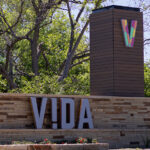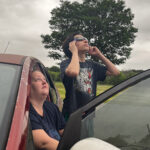[soundslides width=”620″ height =”533″ id=”15807″]
By Adrian (Jax) Garcia
On Monday, San Antonians took to the streets to honor the memory of a man who is arguably one of the greatest civil rights leaders in our nation’s history.
Enter, the Rev. Martin Luther King Jr., a man of vision and persistence. His ideology of non-violent resistance and peaceful protests echoes in the minds of all who have been persecuted and faced the harsh realities of prejudicial inequality.
The untimely assassination of King on April 4, 1968 in Memphis, Tenn. put his civil rights movement at a standstill. His fellow civil rights activists even stalled pursuing equal rights.
King’s message still lives on to call out to the masses for peace and equality. That’s why people gathered Monday and marched along the streets and neighborhoods that bear his name; to honor and celebrate his lifelong message, even after 46 years.
The first MLK march in San Antonio took place in 1972 under the guidance of the Rev. R.A. Callies of First Gethsemane Baptist Church, who passed away in 2011. His first endeavor only involved 25 participants, but soon developed into a solid, reputable turnout and by 1978, included several thousand participants with the help of community organizations.
The city has since been heralded as having one of the largest marches in the nation; an estimated 175,000 people attended the march that began at 3500 Martin Luther King Jr. Blvd. and ended at Pittman Sullivan Park Monday, according to the San Antonio MLK Commission, a city run organization that has affiliated itself with the march’s promotion since 1987.
The expected attendance for this city’s march was 100,000, which is even larger than the expected attendance of other major U.S. cities which have a greater African American population.
Comparing San Antonio to Atlanta
The census data from 2010 indicates that San Antonio has an African American population of 6.9 percent compared to 54 percent in Atlanta, home to four professional sports franchises, the 1996 Olympic Games and the birthplace of King.
The committee in charge of Atlanta’s march, mlkmarchaaar.org expected attendance for Monday’s march to be around 70,000.
So, why, in a city with fewer African American influences, does San Antonio have a greater turnout than most cities inhabited by an African American majority?
That question has been asked before, most recently in a 2013 blog post in The Rivard Report authored by Mitzi Moore titled, “Reflection on the March: Why San Antonio has one of the biggest MLK Day Parades.”
Moore argued that it’s more than our sunny skies and t-shirt temperatures that bring out the crowd for the MLK day march; we are a city that can handle crowds. Prior to addressing San Antonio’s civil rights history as a major factor, Moore spends considerable time on our ability to handle crowds during outdoor activities such as Fiesta, Spurs championship celebrations and live musical venues.
First of all, any Civil Rights leader would have corrected the Rivard Report that the MLK March is not a parade. Most San Antonians, hopefully, are well aware of the difference.
But is that the real reason that San Antonio holds one of the largest active MLK marches in the country? Because San Antonio loves to eat, drink and be merry? Because it falls on a Monday morning due to a government issued holiday?
The San Antonio MLK, Jr. Commission, has indicated that the more likely reason is probably due to this city’s tolerance of free speech and racial and ethnic tolerance.
“I believe that our city has a great ethnic diversity, and that makes our march one of the largest…” said Javier Flores, media representative for the San Antonio MLK, Jr. Commission.
The commission has gone to great lengths to promote the march every year, including a weeklong commemoration entitled Realizing the Dream: Jobs, Justice and Freedom, a celebration of the life and legacy of King, according to www.sanantonio.gov.
The commemoration includes live music and prayer services by local churches, as well as scholarship opportunities for students seeking higher education. There are also many workshops and job fairs to promote employment.
In her blog, Moore says San Antonio’s yearlong fair weather is another reason for the success of the march, a claim refuted by the MLK, Jr. Commission and Mario Salas, Student Nonviolent Coordinating Committee (SNCC) member and political activist.
“Weather was never an issue. There were years when it was sleeting and freezing and we still were strong with 20,000 people,” said Salas, an accomplished professor at UTSA and author on civil rights. “The true success of San Antonio’s march is due to the fact that whites, Latinos, and African Americans all participate in the events.”
Major threats or riots at the march from outside organizations were never an issue, according to Salas.
“They would have to be crazy…there wouldn’t be enough police to protect them,” he joked. “…the spirit of non-violent resistance that Dr. King preached would also prevent such an event.”
Salas was also a highly involved member of Frontline 2000, an organization that was instrumental in raising awareness for civil rights and the state’s official observance of Martin Luther King Jr. Day.
“It’s actually a funny story,” Salas said.
“In 1987, the city of San Antonio recognized the march and helped to contribute to its expansion, but with only assistance with the (Texas) Senate and not the House, we were unable to make MLK Day a holiday. We found that Houston had submitted a bid to host the (NFL) Super Bowl and after the National Football League declared that they would not accept bids from states that did not honor Martin Luther King’s birthday as a holiday, we had a chance to make it happen.”
The NFL’s decision to not accept the 1991 bid from Houston gave major backing to civil rights group such as Frontline 2000 against the Texas state government and the decision was made to honor a state holiday for King, one of the last three states in the country to do so.
Asked if the decision was made out of a change of heart by the state or the fear of losing the potential millions of dollars in income that a Super Bowl in Houston would generate, Salas replied, “It was definitely to appease the football fans of Texas…but it was all for a greater cause.”





